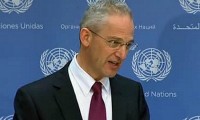 The Secretary-General warmly welcomes the announcement by the Cuban government that it will be sending 165 medical personnel to Sierra Leone soon to assist in the response to Ebola. In addition, the African Union has begun to mobilize medical personnel for the response, and the Government of Ghana has agreed to use Accra as a key hub for flights into and out of Monrovia. Offers of cash, equipment and personnel from governments, NGOs and the private sector have also begun to materialize.
The Secretary-General warmly welcomes the announcement by the Cuban government that it will be sending 165 medical personnel to Sierra Leone soon to assist in the response to Ebola. In addition, the African Union has begun to mobilize medical personnel for the response, and the Government of Ghana has agreed to use Accra as a key hub for flights into and out of Monrovia. Offers of cash, equipment and personnel from governments, NGOs and the private sector have also begun to materialize.
We are also grateful for the continued support of the US government. Last week, the U.S. Agency for International Development announced plans to make an additional $75 million available. More than 100 experts, most of them from the U.S. Centers for Disease Control and Prevention, are deployed to the region in an effort to prevent, detect and halt the virus’s spread.
The UK government also announced that British military and humanitarian experts will set up a medical treatment centre for victims of the Ebola outbreak in Sierra Leone.
The Secretary-General welcomes these signs of solidarity, particularly the deployment of skilled medical teams. He calls on more countries and organizations to move swiftly to support the Governments of the countries affected, through the WHO Road Map and a complete overview of requirements, which will be released by OCHA in Geneva on 16 September.
As you will recall, the Secretary-General has held a number of calls with world leaders seeking their support for the countries most affected – Guinea, Liberia and Sierra Leone. He continues to reach out to leaders around the world on this issue.
The Secretary-General also renews his call for countries to refrain from closing their borders to people coming from Guinea, Liberia and Sierra Leone, and for airlines and shipping companies to maintain transport links. Isolating the countries risks causing more harm and delaying efforts to stop the Ebola virus, rather than preventing its spread.
On Monday, the Secretary-General activated the UN's crisis response mechanism for managing a system wide crisis, and instructed all UN Heads of Agencies and Departments to give top priority to working together in support of a unified, effective response. And our UN teams on the ground are engaged in active support of the national efforts, providing health services, food, supplies and outreach to communities.


Be the first to comment